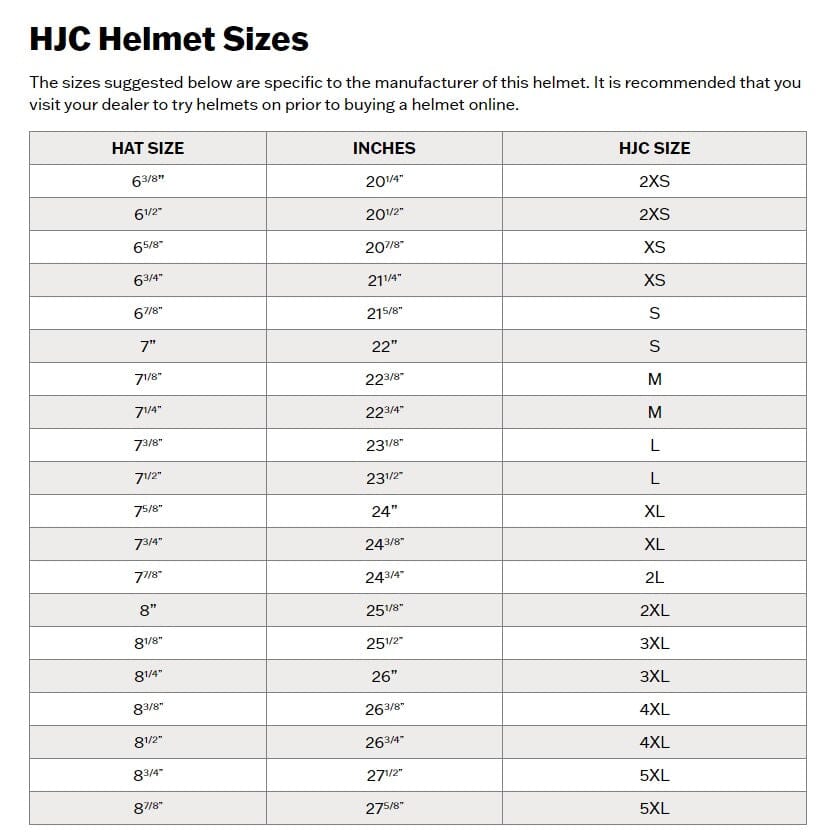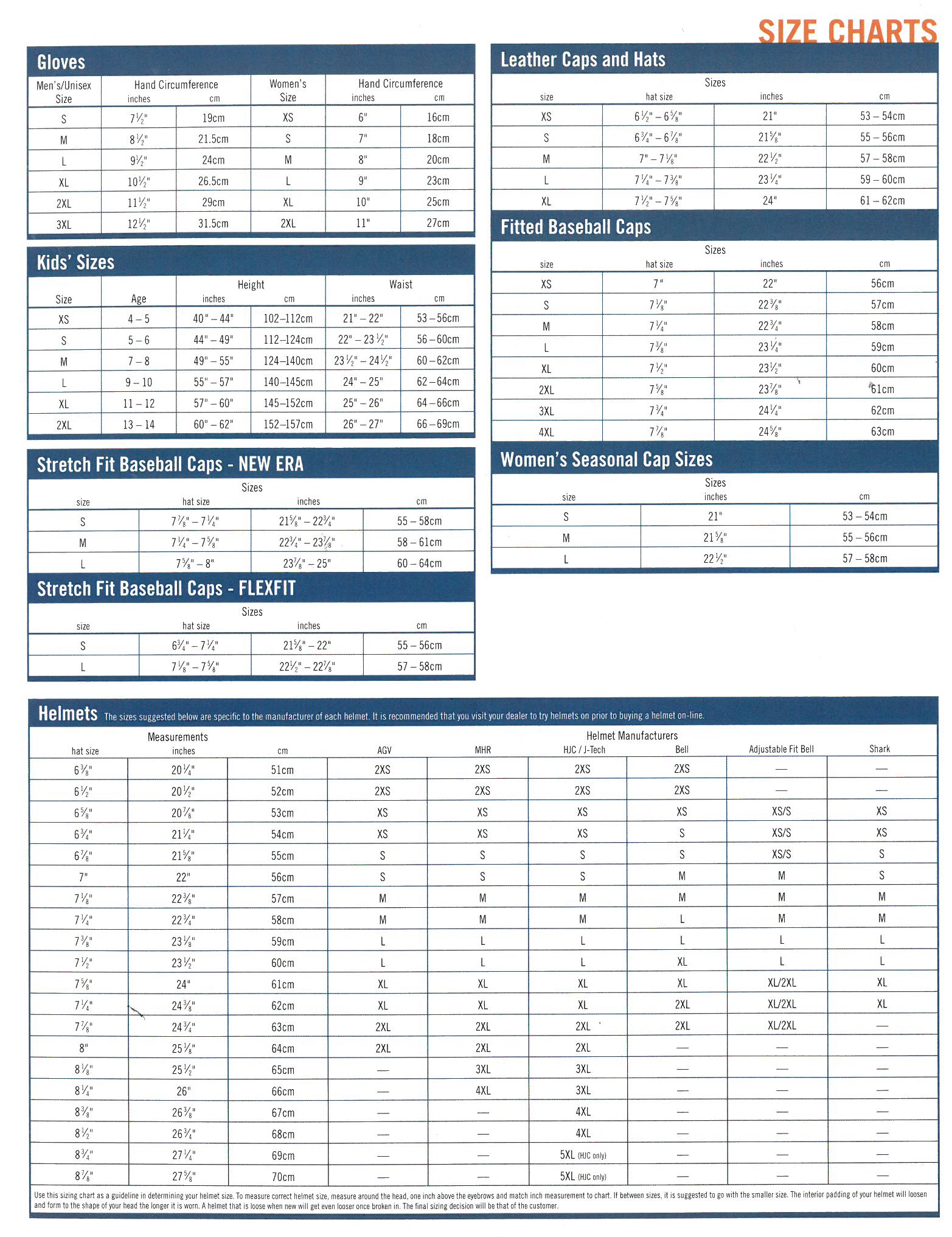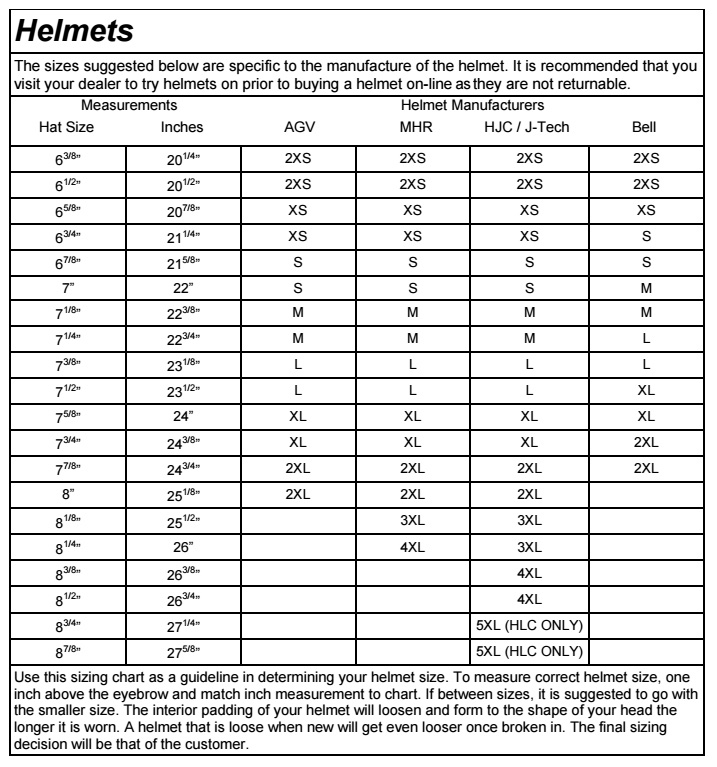Harley Davidson Helmet Size Chart helps riders find the perfect helmet fit. Measure your head’s circumference to choose the right size.
Choosing the correct helmet size is crucial for safety and comfort. Harley Davidson provides a detailed size chart to guide riders. Measure around the largest part of your head, typically just above the eyebrows. Compare your measurement with the chart to find your ideal helmet size.
A properly fitting helmet enhances protection and reduces fatigue during long rides. Always double-check the fit by trying on the helmet. It should feel snug but not tight. Ensuring an accurate fit prevents unnecessary movement and maximizes safety. Harley Davidson’s size chart is an essential tool for every rider.
The Importance Of Proper Helmet Fit
Wearing a Harley Davidson helmet is essential for every rider. A helmet that fits well can save your life. An ill-fitting helmet, on the other hand, can do more harm than good. Let’s explore why the right fit is crucial.
Safety First: The Role Of Fit In Protection
A helmet’s primary job is to protect your head. A proper fit ensures maximum safety. A loose helmet can slip during a crash. This reduces its protective capabilities. A tight helmet can cause headaches and distract you.
The right size ensures the helmet stays in place. It should cover your entire head snugly. There should be no pressure points. Harley Davidson Helmet Size Chart helps you find the right size.
| Helmet Size | Head Circumference (in inches) |
|---|---|
| Small | 21.5 – 22 |
| Medium | 22.5 – 23 |
| Large | 23.5 – 24 |
| X-Large | 24.5 – 25 |
Comfort: Long Rides Demand A Perfect Fit
Comfort is key during long rides. An uncomfortable helmet can ruin your ride. It can cause you to lose focus. A well-fitted helmet feels like an extension of your head.
A proper fit distributes the weight evenly. It reduces neck strain. It also ensures better ventilation. This keeps you cool and comfortable.
Use the Harley Davidson Helmet Size Chart to find your perfect size. Measure your head circumference accurately. Choose the size that fits your head snugly.
- Measure your head with a soft tape.
- Wrap the tape above your ears and eyebrows.
- Check the measurement on the size chart.
A perfect fit enhances both safety and comfort. Enjoy your rides with peace of mind.
Decoding The Harley Davidson Helmet Size Chart
Finding the perfect Harley Davidson helmet size is crucial for safety and comfort. Using the Harley Davidson Helmet Size Chart helps ensure you get the right fit. Decoding this chart can seem daunting, but it’s straightforward with the right guidance.
Key Measurements For Sizing
To determine your helmet size, you need a few key measurements:
- Head Circumference: Measure around the largest part of your head.
- Forehead Width: Measure the widest part of your forehead.
- Head Length: Measure from the back of your head to the front.
Use a soft measuring tape for accuracy. Keep the tape snug but not tight.
Interpreting The Chart: Sizes And Corresponding Dimensions
The chart below provides Harley Davidson helmet sizes and their corresponding dimensions:
| Helmet Size | Head Circumference (inches) | Head Circumference (cm) |
|---|---|---|
| XS | 20.75 – 21.25 | 53 – 54 |
| S | 21.25 – 22 | 55 – 56 |
| M | 22 – 22.75 | 57 – 58 |
| L | 22.75 – 23.5 | 59 – 60 |
| XL | 23.5 – 24.25 | 61 – 62 |
| XXL | 24.25 – 25 | 63 – 64 |
Important: Always refer to the specific helmet model’s size chart. Sizes can vary slightly.
Ensure your helmet fits snugly. It should not move when you shake your head.
Measuring Your Head: Step-by-step Guide
Finding the right Harley Davidson helmet size is crucial for safety. Follow this guide to measure your head accurately. This ensures the perfect helmet fit.
Tools You’ll Need
- A flexible measuring tape
- A mirror
- A friend to help (optional)
- Pen and paper
Correct Measurement Techniques
- Wrap the Tape: Place the measuring tape around your head. Position it just above your eyebrows.
- Check the Fit: Ensure the tape is snug but not tight. It should sit just above your ears.
- Read the Measurement: Look in the mirror or ask a friend to read the measurement. Note the number in centimeters.
- Measure Twice: Double-check your measurement for accuracy. This prevents errors and ensures the best fit.
| Head Circumference (cm) | Helmet Size |
|---|---|
| 52-54 | XS |
| 55-56 | S |
| 57-58 | M |
| 59-60 | L |
| 61-62 | XL |
| 63-64 | XXL |
Use the table to find your helmet size. Remember, a well-fitted helmet is essential for safety on the road.

Credit: www.harley-davidson.com
Types Of Harley Davidson Helmets
Choosing the right Harley Davidson helmet is crucial for safety and comfort. Understanding the types of helmets available helps make an informed decision. Different helmets offer unique features and levels of protection. Let’s explore the various types of Harley Davidson helmets available.
Full-face Helmets: Maximum Coverage
Full-face helmets provide the most protection. They cover the entire head and face. This type is ideal for long rides and high speeds. It offers excellent protection against wind, debris, and impacts.
- Complete head and face coverage
- Built-in visors for eye protection
- Enhanced safety and security
Full-face helmets are popular among sport and touring riders. They offer maximum safety without compromising comfort.
Open-face Helmets: Freedom And Flexibility
Open-face helmets cover the top and sides of the head. They leave the face exposed. These helmets provide a sense of freedom and better visibility. They are perfect for cruiser and vintage bike enthusiasts.
- Exposed face for better airflow
- Great for low-speed, scenic rides
- Often comes with removable visors
Open-face helmets are lighter and more comfortable for short trips. They offer enough protection for casual riders.
Half Helmets: Minimalist Approach
Half helmets cover only the top of the head. They are the lightest and least restrictive helmets. These helmets are popular among riders who value a minimalist look.
- Lightweight and less restrictive
- Minimal coverage but stylish
- Ideal for short, leisurely rides
Half helmets provide basic protection and are best for experienced riders. They offer a classic look with a sense of freedom.
Factors Affecting Helmet Size And Fit
Choosing the right helmet size is crucial for safety and comfort. Various factors influence the fit of a Harley Davidson helmet. Understanding these factors ensures a perfect fit for your ride.
Head Shape Variations
Not all heads are the same shape. Some are round, some are oval. Knowing your head shape helps in picking the right helmet. An ill-fitting helmet can cause discomfort and reduce safety. Use a mirror or ask a friend to check your head shape.
Hair And Headgear
Hair can affect the fit of your helmet. Long hair may need extra space. If you wear headgear, it also impacts the fit. Make sure to try the helmet with your usual headgear on. This ensures the helmet fits well in real-life conditions.
Padding And Liners: Adjusting The Fit
The padding inside the helmet plays a big role in comfort. Some helmets have removable and adjustable padding. This allows for a custom fit. Check if the padding is compressing too much. If so, the helmet might be too tight or too loose.
| Factor | Impact on Fit |
|---|---|
| Head Shape | Round, oval, or intermediate |
| Hair Length | Long hair needs more space |
| Headgear | Impacts the fit |
| Padding | Adjustable for custom fit |

Credit: store.harbortownhd.com
Trying On Helmets: A Practical Approach
Finding the right Harley Davidson helmet size is essential. A well-fitting helmet provides safety and comfort. Here’s how to try on helmets properly.
The Checklist For Proper Helmet Fit
Follow this checklist to ensure your helmet fits perfectly:
- Measure Your Head: Use a tape measure around your forehead.
- Check the Size Chart: Compare your measurement with the Harley Davidson size chart.
- Try It On: Place the helmet on your head. It should feel snug.
- Fasten the Chin Strap: Ensure the strap is secure but not too tight.
- Move Your Head: Shake your head up and down, side to side. The helmet should not move.
- Check Your Vision: Make sure you have a clear line of sight.
Red Flags: Signs Of A Poor Fit
Be aware of these signs that indicate a poor fit:
- Pressure Points: If you feel pressure on your forehead, the helmet is too small.
- Loose Fit: If the helmet moves when you shake your head, it’s too big.
- Uncomfortable Straps: If the chin strap hurts or feels too tight, it’s not right.
- Obstructed Vision: If your vision is blocked, the helmet doesn’t fit properly.
| Size | Head Measurement (inches) |
|---|---|
| Small | 21.65 – 22.05 |
| Medium | 22.05 – 22.44 |
| Large | 22.44 – 22.83 |
| X-Large | 22.83 – 23.23 |
Using this practical approach ensures your Harley Davidson helmet fits perfectly. Safety and comfort are top priorities.
Adjusting Your Helmet For A Custom Fit
Ensuring your Harley Davidson helmet fits perfectly is crucial. A proper fit guarantees safety and comfort. Learn how to adjust your helmet using pads, liners, and straps.
Using Pads And Liners
Helmet pads and liners help achieve a snug fit. Pads come in different thicknesses. Choose the right thickness for better comfort.
Liners can also be replaced or adjusted. They provide added cushioning and help with proper fitting. Simply remove the existing liner and replace it with a thicker or thinner one.
Strap Adjustments And Positioning
Strap adjustments are key to helmet security. Ensure the chin strap fits comfortably under your chin.
Follow these steps for proper strap positioning:
- Place the helmet on your head.
- Adjust the straps to sit just below your ears.
- Buckle the chin strap securely.
- Ensure the straps are tight but comfortable.
Use these tips to adjust your helmet for a perfect fit. Safety and comfort are paramount for every ride.
Maintenance And Care For Optimal Fit Over Time
Maintaining your Harley Davidson helmet is crucial for its longevity. A well-maintained helmet ensures safety and comfort. Regular care helps retain the helmet’s original fit and function.
Cleaning Your Helmet
Cleaning your helmet regularly is important. Follow these steps to keep it in top condition:
- Remove the interior padding: Most helmets have removable padding. Take it out and wash it with mild soap.
- Clean the exterior shell: Use a soft cloth and mild detergent. Avoid harsh chemicals.
- Dry thoroughly: Let the padding and shell air dry. Avoid direct sunlight.
When To Replace Your Helmet
Helmets have a lifespan. It’s important to know when to replace yours:
- After an impact: Replace your helmet if it has been in an accident.
- Check for wear and tear: Look for cracks, fraying straps, or compromised padding.
- Every five years: Manufacturers recommend replacing helmets every five years, even without visible damage.
Regular maintenance and timely replacement ensure your helmet always fits perfectly.
Faqs: Common Questions About Helmet Sizing
Choosing the right size for your Harley Davidson helmet can be tricky. You want to ensure comfort and safety. This section answers common questions about helmet sizing. Find out how to upgrade to a larger size and deal with sizing discrepancies.
Upgrading To A Larger Size
Sometimes you may need to upgrade to a larger helmet size. This could be due to discomfort or head growth. Here’s a simple guide:
- Measure your head circumference using a soft tape measure.
- Compare your measurement with the Harley Davidson helmet size chart.
- Choose a helmet that matches your head size.
Remember, a larger size should not be too loose. The helmet should fit snugly. You should not feel pressure points. If you do, try the next size up.
Dealing With Sizing Discrepancies
Sometimes, the helmet size might not match the chart. This can be due to different head shapes or manufacturing variations. Here are steps to manage sizing discrepancies:
- Measure your head size accurately.
- Check the size chart carefully.
- Try on different sizes in-store if possible.
- Consult with a store expert for the best fit.
If you buy online, make sure the store has a good return policy. This ensures you can exchange the helmet if it doesn’t fit.

Credit: www.sturgisharleydavidson.com
Conclusion
Finding the perfect Harley Davidson helmet size is crucial for safety and comfort. Use the size chart to ensure a secure fit. A well-fitted helmet enhances your riding experience and offers maximum protection. Always measure your head accurately and refer to the chart before making a purchase.
Ride safely and confidently.

